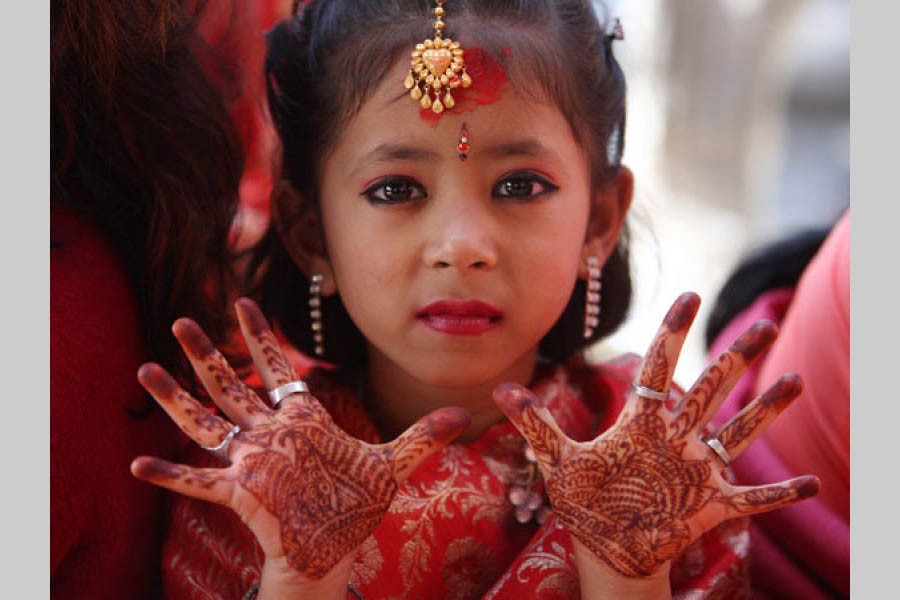In Bankim Chandra's novel 'Debi Coudhurani', Profullo (10) broke down in tears on getting the news that her close friend of the same age was going to be married soon and she was going to lose a playmate.Since the time of writing that novel, apparently things have changed only marginally. According to the United Nations Children's agency UNICEF just a few years back, Bangladesh had the fourth-highest rate of child marriage in the world, after Niger and Chad in Africa. At that time, about three-fourths of Bangladeshi women aged 20-49 were married or in a union before age 18, despite the minimum legal age of marriage for women being 18. During the period 2005 to 2013, according to UNICEF, two-thirds of girls in Bangladesh were married before 18, and 29 per cent were married before the age of 15.
Things have changed in a positive direction since then, albeit at snail's pace. Awareness about the evils of child marriage has been created through the efforts of the government, non-government organisations (NGOs), civil society and the media. Electronic and newspaper reports on the abuses of child marriage have advanced the fight against child marriage. The Ministry of Women and Children Affairs seems to have taken the matter very seriously. At grassroots, communities have been engaged to see to it that child marriages are reduced.
Let us examine the finding that was mentioned earlier. According to the Census 2013, primary enrolment for girls (6-10) have increased almost cent per cent and at secondary level (11-16) 91 per cent; it implies that roughly 10 per cent drops out due to marriage or other reasons before the age of 16. But at higher secondary level the enrolment is only 21 per cent, indicating that about 70 per cent drops out between secondary and higher secondary levels. Even if we assume that some of them drop out to join jobs, the remaining drop outs due to marriage are very high.
There is a high incidence of child marriage in rural areas (70 per cent) compared to urban areas (53 per cent). Education is another correlated variable - 80 per cent of no education and only primary education are married off before 18, compared to 57 per cent of girls who studied at least up to secondary level. Girls from poorest 20 per cent of families are twice as likely to marry before 18 as girls whose families are among the richest 20 per cent. Third, there is increased risk of child marriage in case of families affected by natural disasters associated with climate change. A 2014 study found that impetus for child marriage and dowry are exacerbated by the climate change experienced by families in rural Bangladesh.
Recent studies have shown that early marriage for girls leads to lower schooling and the onset of early pregnancy. Over 20 per cent of those who become brides before reaching 15 years turn into mothers of 3 or more children before they are 24 (UNICEF 2014). Various surveys undertaken on child marriage also highlight an inter-generational agency trap: Mothers marrying early were less likely to have a say on their own marriage, and less willing to give consent if their daughters choose their own life-partners.
Combined evidences from renowned survey institutions suggest that women who make their own choices of partners - with access to education and employment opportunities making possible increased social contacts - are prone to marry later, with positive benefits for the subsequent generation. Girls who are married young are more vulnerable to partner violence and sexual abuse than those who marry later. This is especially true when the age gap between the bride and the groom is big. A number of influential studies including one by the United Nations have shown that, even though some parents believe early marriage would protect their daughters from sexual violence, the reverse is often true.
Using baseline data from BRAC's Adolescent Development Program (ADP), we can document the inter-generational consequences of early marriage on mothers and their adolescent children sampled from the poorest 19 North-eastern districts of Bangladesh. We examined the extent to which a low level of numeracy among children is explained by early marriage of their mothers. In our data, the level of basic numeracy skills is very low for both groups. Mothers marrying after the age of 15 had about one more year of schooling than those married earlier. Similarly, numeracy and Bangla and English literacy scores of these mothers were much lower compared to those who married at or after 18. Our analysis confirmed a causal effect of mother's early marriage on children's cognitive development. Moreover, the effect is significant only for daughters. We find evidence of both direct and indirect effects of mothers' early marriage on children. The indirect effect operates by lowering the schooling years, which in turn lowers the cognitive skills of mothers.
Among the correlated variables of child marriage especially among the poorer segments, as various studies tend to reveal, concern about sexual abuse of girls among the influential segments in the community often force early marriages. It has been opined by experts that eve-teasing on way to schools or threats of rape lead to dropouts from schools and subsequent child marriages. Thus the bottom-line for reducing the incidence of child marriage is strict adherence to the rule of law. Meanwhile, ongoing government and non-governmental efforts aimed at reducing child marriage should continue.
The recent UNICEF report reads like this: eradication of child marriage is slowly occurring; however, the rates are still high with 66 per cent of girls married before the age of 18. Over one-third of girls are married before the age of 15. Legally, the minimum age of marriage is 21 for boys and 18 for girls.
The red light seems to be still on as far as early marriage of girls is concerned.
Abdul Bayes is a former Professor of Economics at Jahangirnagar University.


